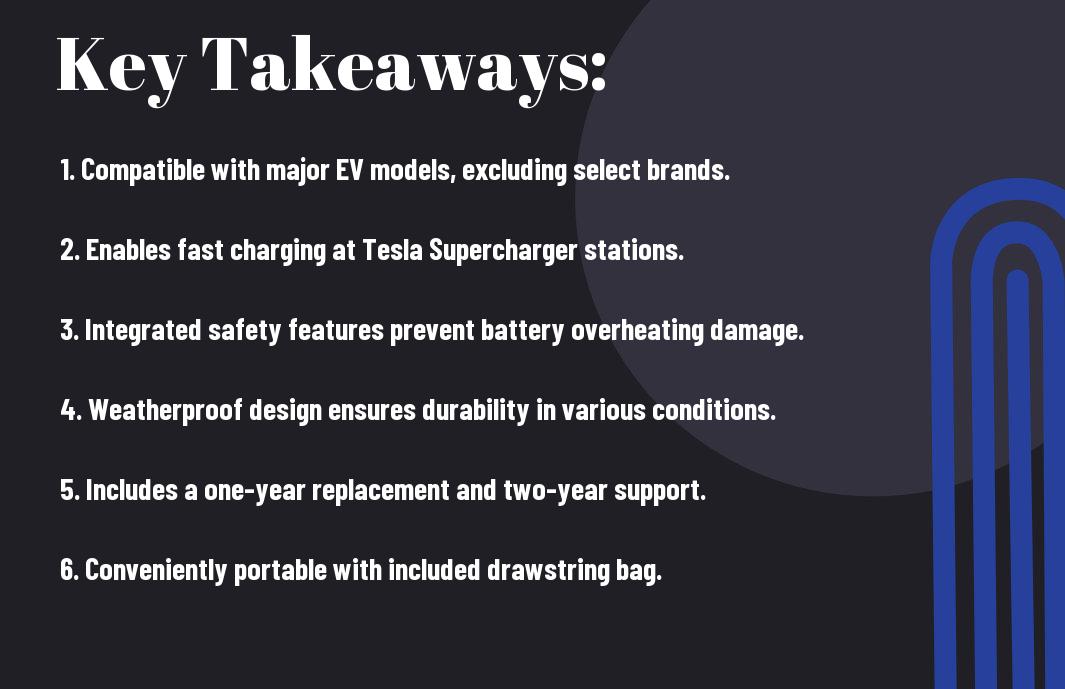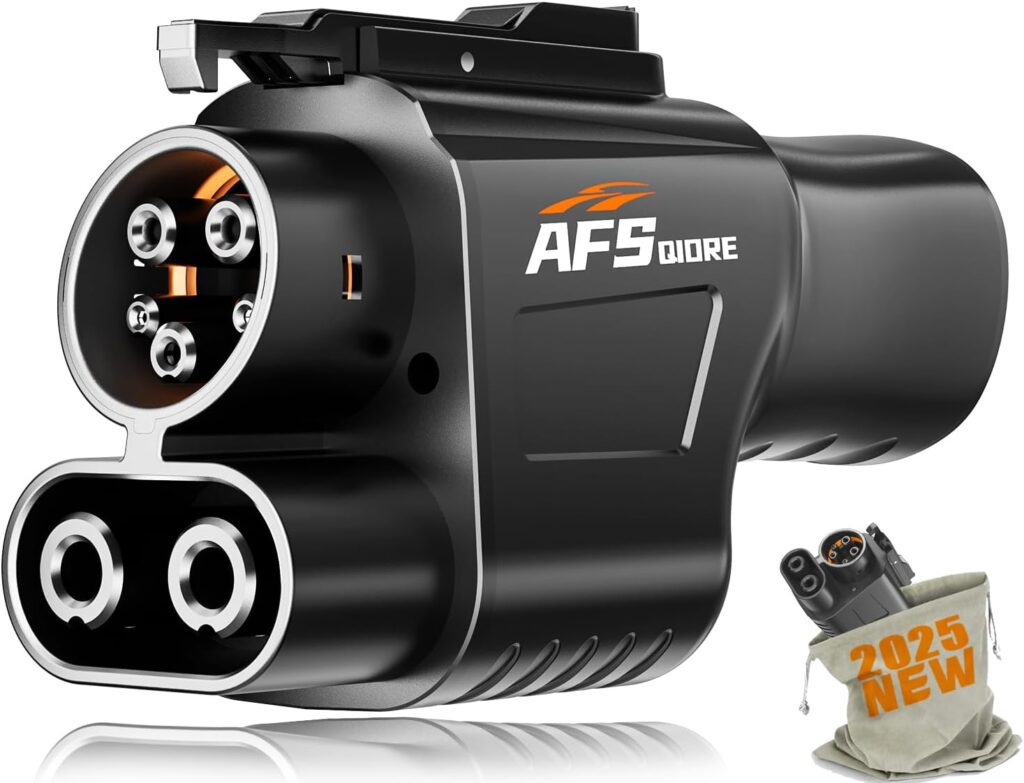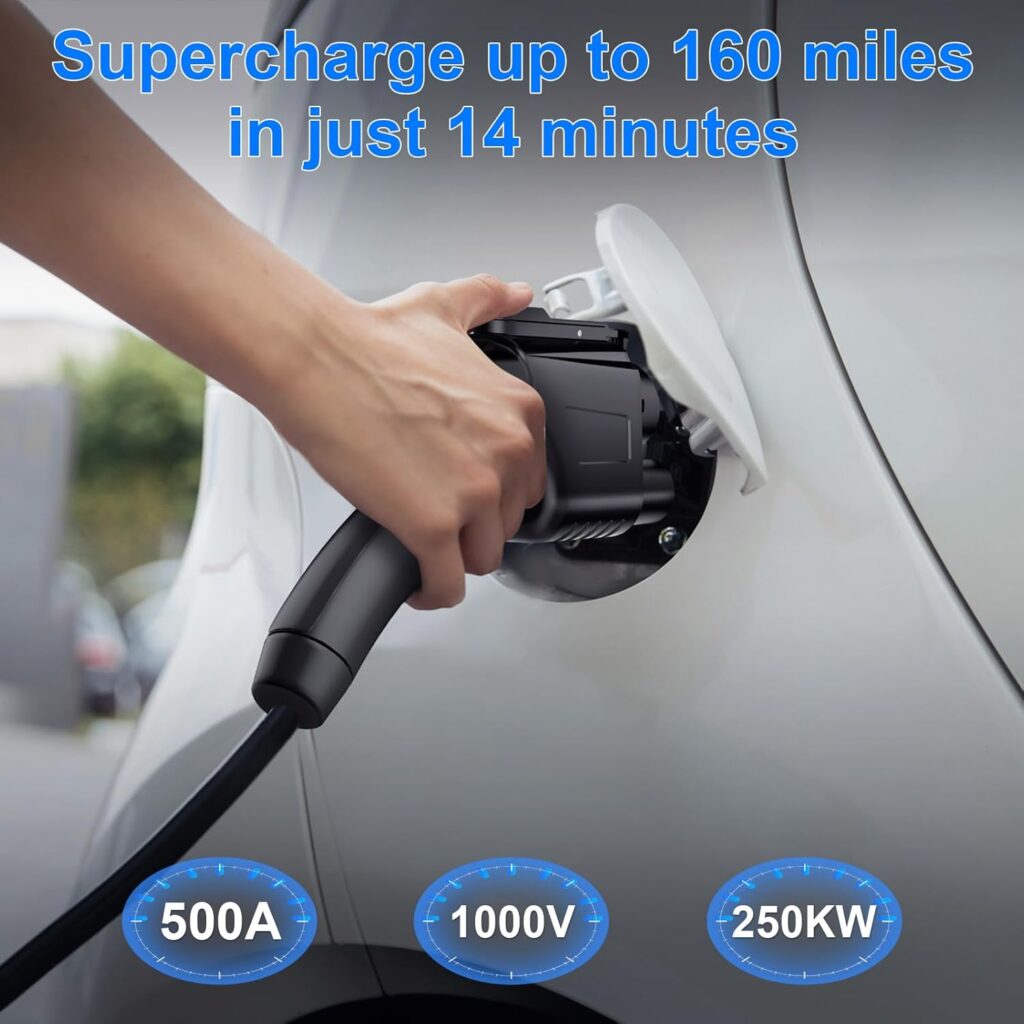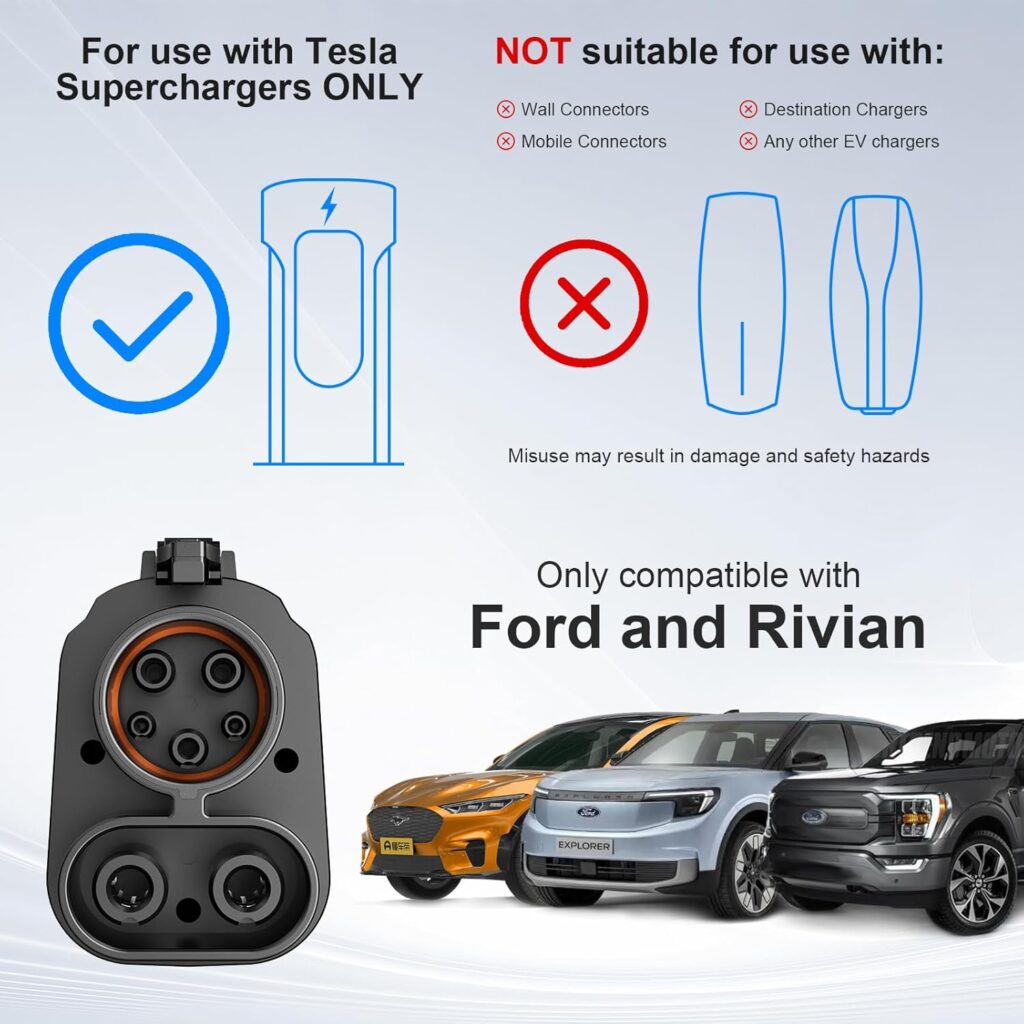There’s nothing more valuable than making an informed decision when choosing between competing NACS to CCS Adapter products in the market. When you’re evaluating your options, understanding the key differences between competitors can save you both time and money. Your success in selecting the right product depends on analyzing critical factors like compatibility, performance metrics, and safety features. This comprehensive comparison will guide you through the necessary features and limitations of leading market alternatives, helping you make a choice that perfectly aligns with your specific needs.
>>>>>>>>>Check the price for AFS QIORE NACS to CCS Adapter<<<<<<<<<<<<<<

Understanding Competitors
To effectively analyze the EV charging adapter market, you need to understand the competitive landscape, market dynamics, and key players shaping the industry. Your success depends on identifying both direct and indirect competitors while staying informed about emerging technologies and market trends.
Disclaimer: As an Amazon Associate, I earn commission from qualifying purchases.
Definition of Competitors
An organization competing in the same market space, offering similar EV charging solutions or alternatives that fulfill the same customer need. Your competitors include both established manufacturers and new entrants providing NACS to CCS adapters and related charging technologies.
>>>>>>>>>Check the price for AFS QIORE NACS to CCS Adapter<<<<<<<<<<<<<<
Types of Competitors
| Competitor Type | Description |
|---|---|
| Direct | Other NACS adapter manufacturers |
| Indirect | Alternative charging solutions |
| Potential | Emerging technology companies |
| Replacement | New charging standards |
| Budget | Low-cost alternatives |
Types of competitors in the EV charging market include:
- Premium brands offering high-end adapters
- Value manufacturers with basic solutions
- Tech innovators developing new standards
Though competition is intense, your focus should remain on quality and safety features.
Also, consider these market segments:
| Market Segment | Key Features |
|---|---|
| High-end | 250KW charging capability |
| Mid-range | 160-mile range in 14 minutes |
| Economy | Basic charging functionality |
| Professional | Enhanced safety features |
| Consumer | User-friendly design |
Analyzing Competitor Strengths
The competitive landscape of EV charging adapters reveals diverse market players offering various solutions. Your understanding of competitor strengths will help you identify key differentiators and make informed decisions about charging solutions for your electric vehicle.
>>>>>>>>>Check the price for AFS QIORE NACS to CCS Adapter<<<<<<<<<<<<<<
Market Position
The market for NACS to CCS adapters shows significant growth with Tesla’s charging network expansion. You’ll find that leading competitors focus on compatibility with multiple EV brands and access to over 15,000 Tesla Supercharger stations. Your charging options now include fast-charging capabilities up to 250KW, allowing you to add 160 miles in just 14 minutes.
Brand Reputation
Before selecting an adapter, you should evaluate manufacturers’ safety certifications and testing protocols. Your potential options include products with CE, FCC, and RoHS certifications, demonstrating compliance with international safety standards.
Brand reliability in the EV adapter market stems from rigorous testing and safety features. You’ll benefit from features like IP65 waterproofing, temperature control systems, and extensive durability testing with over 20,000 mating cycles. Your investment is typically protected by comprehensive warranty coverage, often including one-year replacement guarantees.

Evaluating Competitor Weaknesses
After analyzing the EV charging adapter market, you’ll find that most competitors lack the comprehensive compatibility range and advanced safety features. While some adapters claim universal compatibility, they often fail to support newer EV models or provide limited charging speeds, making your charging experience less efficient.
Product Limitations
Between various competing adapters, you’ll notice significant limitations in charging capabilities. Most competitors can’t match the 250KW charging rate and don’t offer temperature control systems. Your charging sessions with these alternatives might take longer, as they typically don’t provide the impressive 160-mile range in 14 minutes performance.
Customer Feedback
Feedback from your fellow EV owners reveals common complaints about competitor products, including inconsistent locking mechanisms and lack of weather resistance. Users frequently report connectivity issues with non-Tesla charging stations, limiting their charging options significantly.
Weaknesses in competing products become evident through real-world usage, where you’ll encounter issues with durability and reliability. Unlike our adapter’s verified 20,000 mating tests and IP65 waterproof rating, most competitors lack comprehensive testing and certification. Your charging experience might be compromised by products that don’t offer the same level of safety features or warranty support.
Competitive Analysis Tools
For successful market positioning, you need to employ various analytical tools to understand your competition. These tools help you identify market opportunities and potential threats in the EV charging adapter industry, where competitors are vying for market share in a rapidly growing sector worth over $250 billion globally.
SWOT Analysis
Competitive intelligence gathering through SWOT analysis helps you evaluate your product’s strengths, like 250KW charging capability and compatibility with multiple EV brands, against weaknesses such as limited compatibility with certain manufacturers. This analysis reveals opportunities in the expanding Tesla Supercharger network and threats from emerging charging standards.
Market Research Techniques
Across the EV charging adapter market, you’ll find various research methods to gauge your competitive position. These include analyzing customer feedback, monitoring pricing strategies, and tracking technological advancements in charging speeds and safety features.
A comprehensive market research approach enables you to identify your target audience’s preferences, track competitor innovations, and understand market trends. This data helps you position your product effectively, highlighting unique features like your IP65 waterproof rating and exclusive temperature control system that sets you apart from competitors.

Strategies for Competing
Not all charging adapters are created equal in today’s competitive EV market. Your success depends on understanding the key competitive advantages that set products apart. When you analyze the market, you’ll find that manufacturers focus on two main strategies: differentiation and cost leadership, each offering unique benefits for your charging needs.
Differentiation
Against standard adapters, premium products offer advanced safety features like dual temperature sensors and IP65 waterproofing. You’ll find that leading adapters support charging rates up to 250KW, delivering 160 miles in just 14 minutes. Your investment in superior technology ensures compatibility with over 15,000+ Tesla Supercharger stations.
Cost Leadership
Behind every pricing strategy, manufacturers balance quality and affordability. You’ll discover that budget-friendly options often focus on important features while maintaining basic safety standards like CE and FCC certifications.
But your decision should consider long-term value. When you compare warranties, premium adapters typically offer one-year replacement guarantees and two-year support, potentially offsetting higher initial costs through extended product life and reliable performance.

Case Studies of Successful Competitors
Now you can see how different EV charging adapter manufacturers have achieved remarkable success in the market. Here’s what the data reveals:
- Tesla Supercharger Network: 15,000+ stations, delivering up to 250kW charging speeds
- Ford Adapter Solutions: Compatible with 6 different EV models, achieving 160-mile range in 14 minutes
- Rivian Compatibility: Successfully integrated with R1T, R1S, R2, R3 models
- Safety Standards: IP65 waterproof rating, 20,000+ mating tests completed
Industry Leaders
The market shows clear dominance by manufacturers offering universal compatibility and superior safety features. You’ll find these adapters supporting charging rates up to 250kW, with advanced temperature control systems and automatic shutdown protection.
Emerging Competitors
Any new player in the market must focus on innovative safety features and broader vehicle compatibility. You’ll notice emerging brands introducing features like exclusive temperature guards and enhanced locking mechanisms.
Studies show that successful emerging competitors are focusing on your needs for portable solutions and comprehensive warranty coverage. You can expect these manufacturers to offer one-year replacement guarantees and extended support services, making your charging experience more reliable and secure.
Final Words
Ultimately, your choice of a Tesla NACS to CCS adapter can significantly impact your EV charging experience. After comparing competitors, this adapter stands out with its 250KW charging capability, comprehensive safety features, and compatibility with major EV brands like Ford, GM, and Rivian. You’ll benefit from access to over 15,000 Tesla Supercharger stations, enhanced by exclusive features like Temp° Guard and IP65 waterproofing. With the included one-year replacement warranty and two-year support, you’re making a secure investment in your EV charging solution.
>>>>>>>>>Check the price for AFS QIORE NACS to CCS Adapter<<<<<<<<<<<<<<